Clifford Symposium Prompts Conversation on Race and the History of ‘Othering’
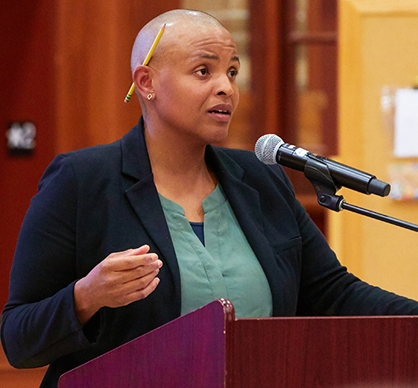
MIDDLEBURY, Vt. – For the 15th consecutive year, Middlebury College opened the academic year with the Clifford Symposium—a campuswide conversation on a single, provocative topic that included lectures, film screenings, readings, performing arts, workshops, and discussion.
The title of the 2018 symposium was “Toni Morrison’s The Origin of Others,” which President Laurie L. Patton called “an important and deeply relevant examination of what it means to be a stranger to, and to estrange, one another.”
In opening the symposium, the president affirmed, “I believe that we at Middlebury have only begun to scratch the surface of the ongoing and deeply historical conversations we need to have in this symposium about race and about all forms of difference: class, gender, gender identity, sexuality, and religion, just to name a few.
“We need to think and talk about difference,” she said. “We need to think about all the ways we have ‘othered’ humans in the past and continue to do so in the present here in this community, here at Middlebury.”
Morrison’s collection of essays, published in 2017, encourages readers to examine issues from another point of view. It allows them “an opportunity to be and to become the Other. The stranger. With sympathy, clarity, and the risk of self-examination,” as the author explains in “Narrating the Other,” the fifth of six essays in the book. All of Middlebury’s first-year students and many faculty and staff members read The Origin of Others in preparation for the 2018–19 academic year.
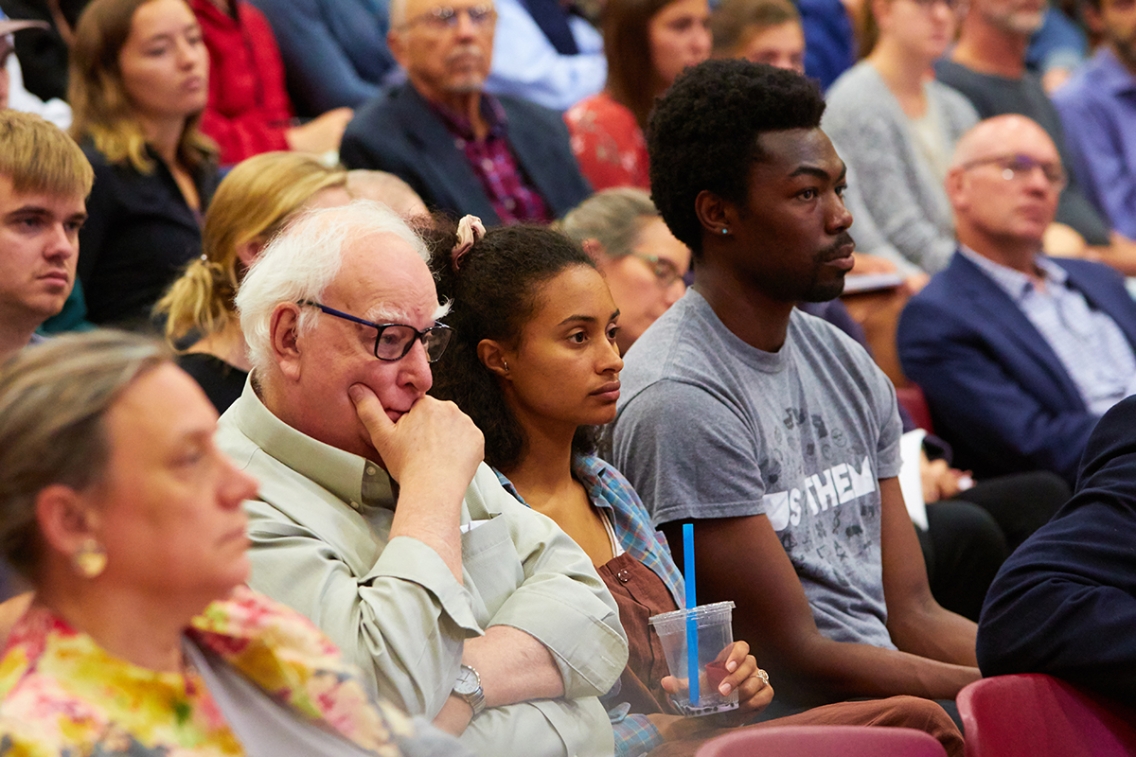
Faculty, staff, and students listen intently to the opening keynote address by Professor J Finley at the Clifford Symposium on September 20 in Wilson Hall.
Two of the faculty organizers of the symposium, Assistant Professor J Finley and Professor William Nash, delivered powerful keynote addresses for the students, faculty, staff, and community members who filled Wilson Hall at the opening on September 20.
Finley, an assistant professor of American studies and gender, sexuality, and feminist studies, gave a talk titled “‘Yonder they do not love your flesh’: Ghosts, Strangers, and the Specter of Race,” and in it she marked the 1991 Rodney King beating as “the moment when ‘the evidence of things not seen’ became seen and served as a turning point in our nation’s reckoning with racist state-sanctioned violence.” Concrete proof of anti-black violence, which previously had to be taken “on faith,” continues to grow today “with each cell phone video, audio recording, or dashboard camera making another piece of evidence of abuse, mistreatment, and brutality.”
From Rodney King on, “there is a record of the ways in which what it means to be black coheres and congeals on the torn flesh of those subjected to the racial state where blackness of flesh signifies, and has always signified, a need to be controlled,” Finley added. “We know that black people are routinely subject to state violence, but the video of [Eric] Garner’s death [at the hands of the NYPD], like that of Rodney King and now so many others, leaves a trace of that reality in a way that reveals the manner in which anti-black violence is perpetuated.”
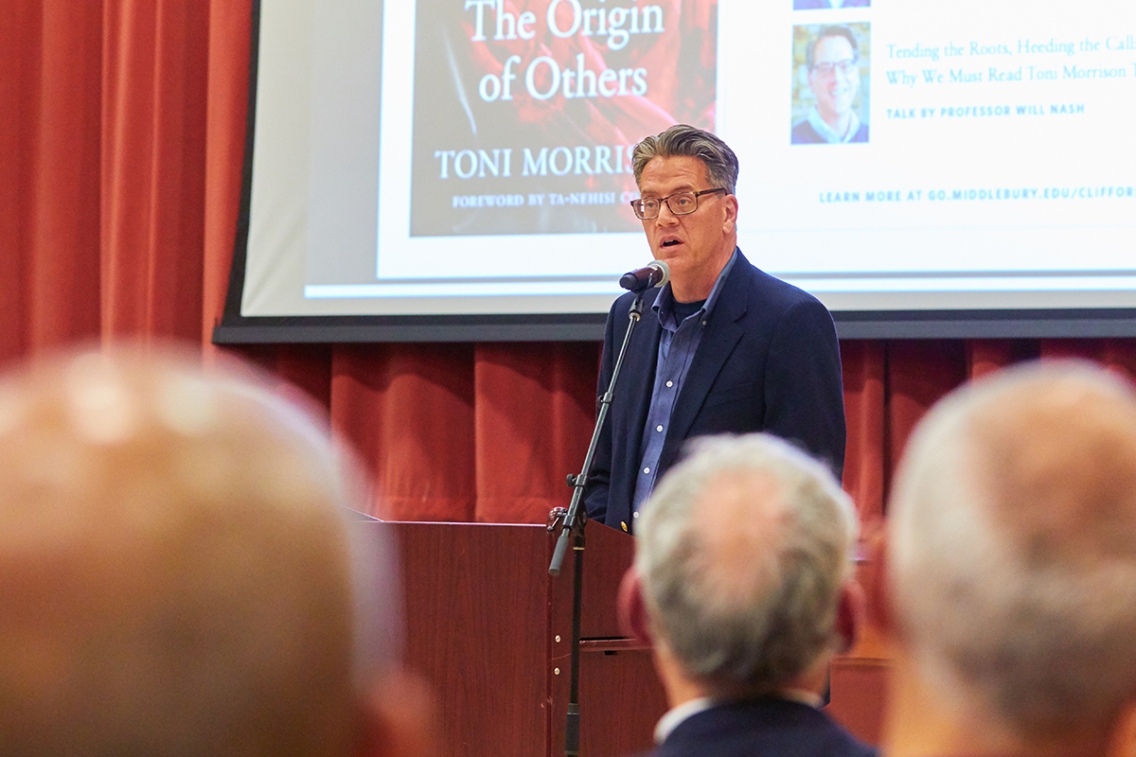
Professor Will Nash gave a keynote address titled “Tending the Roots, Heeding the Call: Why We Must Read Toni Morrison Today.”
Finley said Eric Garner’s death in 2014 and the death of the child Beloved in Morrison’s post-Civil War novel by the same name are linked by the “lingering inheritance of racial slavery,” as sociologist Avery Gordon put it. Or as Morrison herself said, “Beloved’s haunting of her family is an allegory for how the legacy of chattel slavery haunts America; the nation is haunted by the ghost of the racialized Other forged in and through slavery.”
“We think of whiteness and blackness as separate as separate can be,” Finley said, “but whiteness cannot exist without blackness – blackness is the haunting force animating what it means to be a white person in the United States. To put a finer point on it, the violence of what it means to be black is a constitutive element of what it means to be white.”
The second keynote speaker, Will Nash, a professor of American studies and English and American literatures, gave a keynote address titled “Tending the Roots, Heeding the Call: Why We Must Read Toni Morrison Today.”
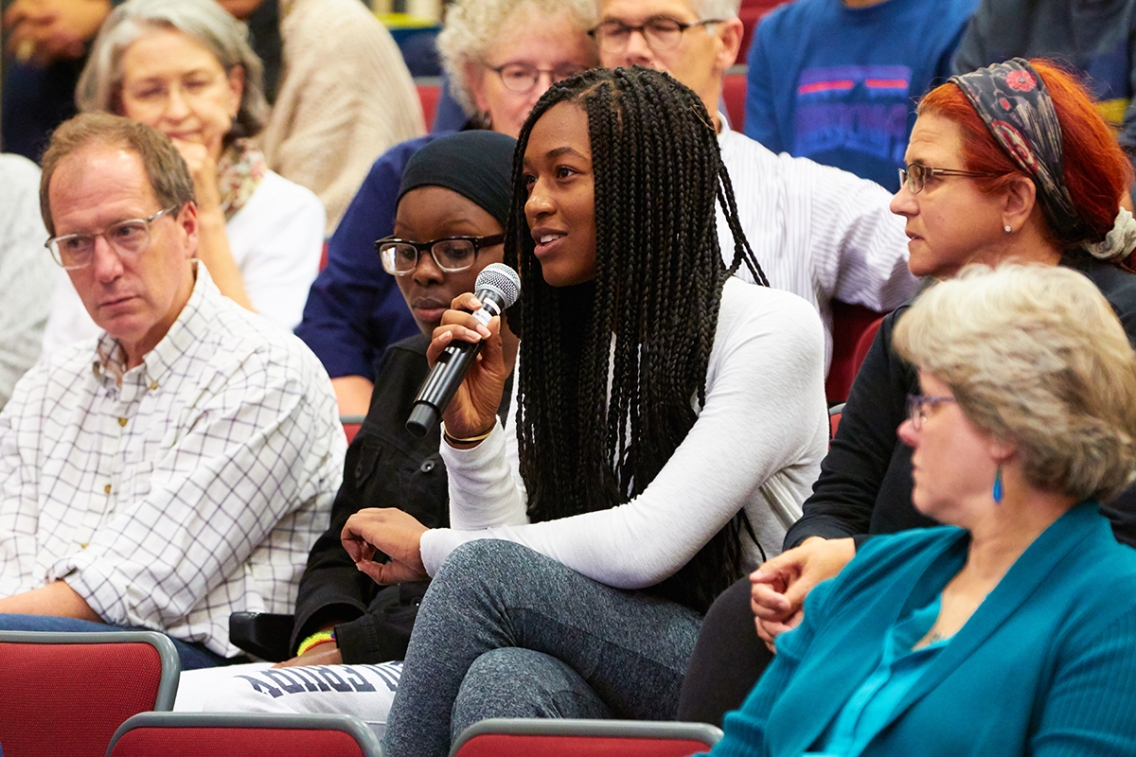
A student asks a question of keynote speaker J Finley at the opening session of the Clifford Symposium.
“In our current cultural moment,” Nash said, “when the escalation of racist thoughts and actions threatens to further rend the social fabric of our communities, when people stay silent out of fear of misspeaking or being misunderstood, when individuals believe themselves powerless in the face of ‘what has always been,’ Morrison’s bold exploration and explanation of these questions offers us much-needed guidance towards deeper understanding and mutual respect.”
Nash traced the “arc of engagement across the span of Morrison’s writing life” by looking closely at three of Morrison’s novels and “the cultural moments in which they appeared. In each instance, the novel comments on Black Americans’ present circumstance by turning to the past.”
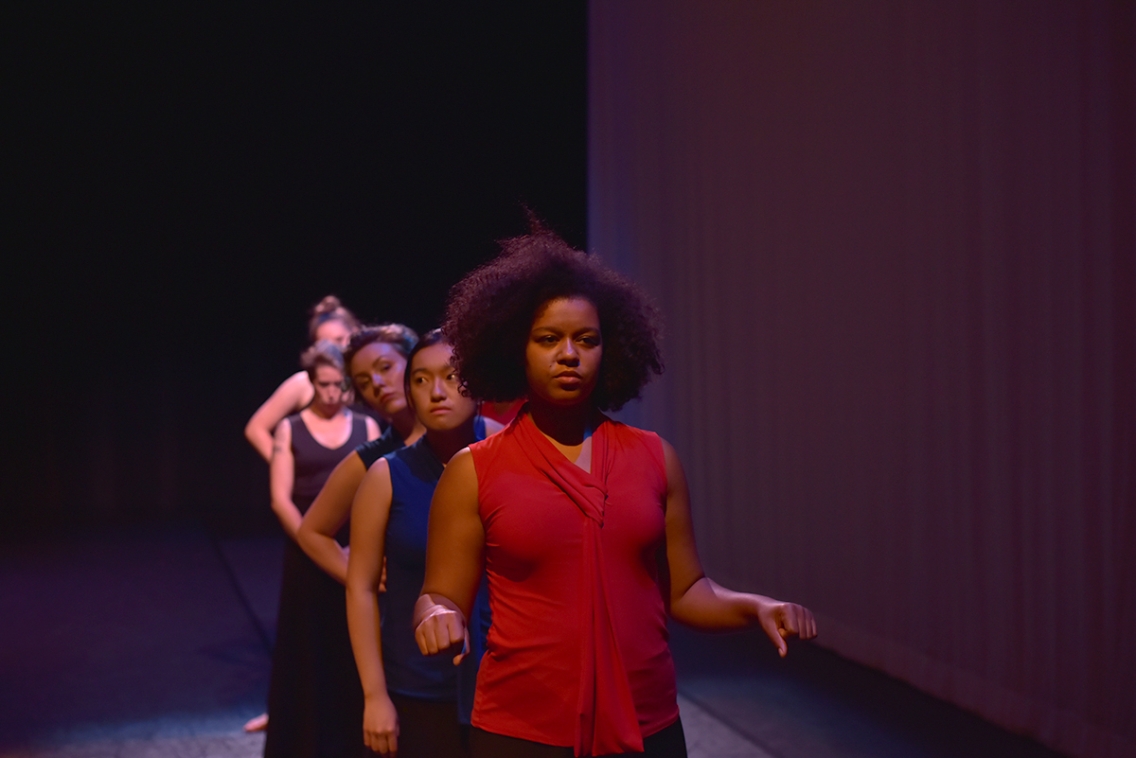
Three faculty members—Michole Biancosino, Christal Brown, and Matthew Taylor—created an adaptation of Toni Morrison’s short story “Recitatif,” which was performed at the Dance Theatre during the Clifford Symposium. Above: Quincy Simmons ’18, Emily Ma ’21, Eliza Renner ’18, Visiting Assistant Professor of Dance Lida Winfield, and Sam Kann ’21.5.
After his analysis of The Bluest Eye, Song of Solomon, and Beloved, Nash said, “We must read Morrison now because she has once again produced a work deeply concerned with the cultural complexities and conflicts that we, her first-time readers for that text, are either working through or suffering under, depending on how one prefers to frame things. Not to put too fine a point on it, but that statement resonates strongly with the hopes that we, the organizers of this Clifford Symposium, have for what might come of it—that these questions about belonging and separation can be evocative and empowering for our community as we continue to wrestle with the question of who we are going to collectively be.”
Nash concluded optimistically: “One thing is absolutely certain, however. Any hope of moving forward meaningfully is grounded in a thorough treatment of where we’re coming from, an exploration of what that past meant to the people who lived it, and a meditation on what it might mean for us. And to find that, we need look no further than the works of Toni Morrison.”
The symposium was organized by Professors Finley, Nash, and Larry Yarbrough, and students Nia Robinson ’19 and Shatavia Knight ’20. The three-day event also included a screening of the film The Foreigner’s Home with a talk and workshop presented by two of its producers; readings of Morrison’s works by members of the student organization Oratory Now with an open discussion; and a staged adaptation of Morrison’s short story “Recitatif” created by faculty members Michole Biancosino ’98, Christal Brown, and Matthew Taylor.
By Robert Keren; Photos by Todd Balfour and Pele Voncujovi ’19

